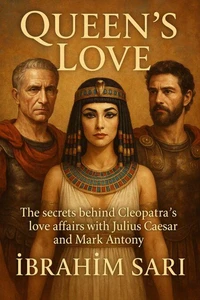History remembers victors. Myth remembers martyrs. But sometimes, the greatest truths lie between the two. Lost Queen reclaims the voice of Queen Dido of Carthage-not as the tragic figure immortalized in Virgil's Aeneid, but as a visionary leader, a founder, and the enduring spirit of a city that refused to die. In the classical canon, Dido appears briefly-her love for Aeneas ending in betrayal, despair, and death, her curse sealing the fate of Carthage and Rome.
But what if that was only part of the story? What if her legacy was not one of ruin, but of resilience? What if her flame never truly went out?This novel dares to imagine what history left unsaid. From her escape from Tyre to the founding of Carthage, from palace intrigue to the forging of alliances, from love tested by politics to sacrifice made for the survival of her people-Dido's journey is told here in her own voice.
Richly woven with the sights, sounds, and spirit of the ancient Mediterranean, Lost Queen explores themes of exile and belonging, love and betrayal, power and sacrifice, and the enduring fight to be remembered on one's own terms. Alongside the story of Dido herself, readers will meet the spiritual heirs, poets, and rebels who carried her name forward through centuries of change. This is not the tale of a woman undone by love-it is the story of a queen who built an empire from nothing, whose courage lit a flame that could not be extinguished.
A flame carried in the hearts of her people, long after her time. For readers of Madeline Miller's Circe and Natalie Haynes' A Thousand Ships, Lost Queen offers a fresh and empowering reimagining of a legendary figure-part history, part myth, all heart. Step into ancient Carthage. Stand before its towers. Hear the whisper of its founder:"Remember me not for how I died, but for what I built-and what I dared to love."
History remembers victors. Myth remembers martyrs. But sometimes, the greatest truths lie between the two. Lost Queen reclaims the voice of Queen Dido of Carthage-not as the tragic figure immortalized in Virgil's Aeneid, but as a visionary leader, a founder, and the enduring spirit of a city that refused to die. In the classical canon, Dido appears briefly-her love for Aeneas ending in betrayal, despair, and death, her curse sealing the fate of Carthage and Rome.
But what if that was only part of the story? What if her legacy was not one of ruin, but of resilience? What if her flame never truly went out?This novel dares to imagine what history left unsaid. From her escape from Tyre to the founding of Carthage, from palace intrigue to the forging of alliances, from love tested by politics to sacrifice made for the survival of her people-Dido's journey is told here in her own voice.
Richly woven with the sights, sounds, and spirit of the ancient Mediterranean, Lost Queen explores themes of exile and belonging, love and betrayal, power and sacrifice, and the enduring fight to be remembered on one's own terms. Alongside the story of Dido herself, readers will meet the spiritual heirs, poets, and rebels who carried her name forward through centuries of change. This is not the tale of a woman undone by love-it is the story of a queen who built an empire from nothing, whose courage lit a flame that could not be extinguished.
A flame carried in the hearts of her people, long after her time. For readers of Madeline Miller's Circe and Natalie Haynes' A Thousand Ships, Lost Queen offers a fresh and empowering reimagining of a legendary figure-part history, part myth, all heart. Step into ancient Carthage. Stand before its towers. Hear the whisper of its founder:"Remember me not for how I died, but for what I built-and what I dared to love."

 , qui est-ce ?
, qui est-ce ?